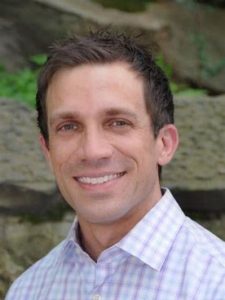A Judaism for Flourishing
This week’s post is by Rabbi Ben Spratt, the Senior Associate Rabbi of 
I begin with a belief that is neither new nor radical: the purpose of Judaism is fulfillment and flourishing, personally and globally. Maimonides made this claim in his Guide for the Perplexed, saying that the whole of the Torah “aims at two things: the wellness of the soul and the wellness of the body,” and the Torah itself says that its purpose is to help people live in a way that is “wise and discerning.” Nahmanides held that every mitzvah, every Jewish responsibility and practice has a to’elet – a benefit – intended to help our growth of mind, body, and spirit. Jewish wisdom and practice carries with it an implicit promise to make one better, wiser, and more fulfilled. The challenge is that many of us have lost a purpose beyond the monikers of “tradition” and “continuity.” For many of us, when we look at the sources of fulfillment and meaning in our lives, Judaism is often not its primary source.
There is a reason why meditation studios are booming, why every SoulCycle class is filled, and why wellness has exploded into a 3 trillion-dollar industry. In 2019, we crave fulfillment and meaning, and we are willing to invest our time, energy, and money in the places that offer them.
And there is a reason why we prioritize a night out on the town over a night volunteering in our congregational homeless shelter. Why most are more likely to light the screen on our Kindle than kindle the Shabbat candles. Why one of the most popular Jewish books on Amazon is How to lead a 10-minute Passover Seder, but there’s seemingly no market for the book on How to Feel Like you Ran the NYC Marathon in 10 Minutes. Obligation is not enough to consistently take us to the heights of humanity nor the peaks of Jewish life.
When Jewish practice feels off-message, when doing Jewish feels only like a nod to the past without also being a courageous practice towards the future, when Jewish learning conjures up memories of falling asleep more than recalling our greatest times of inspiration, we see what happens when we spin away from meaningful purpose. And what an inspiring purpose we have – our purpose is fulfillment, in our life and the life of the world around us. In the way that the term “mindfulness” has come to mean “intentional, calm, centered,” and “organic” has come to mean “healthy” and “better,” imagine if “Jewish” meant “authentic,” “fulfilling,” “a pathway to thriving?”
In pondering the propositions of Jewish Megatrends, I was struck by not only the resonance with patterns already emerging in my own congregation and beyond, but also with the ancient echoes of those before us. For me, I would place the final proposition (4) as our core priority both personally and collectively: “In an age when we better understand the shortcomings of capitalism and the culture of consumerism, the Jewish community must offer a glimpse of kedusha, experiences that provide holiness, transcendent meaning and a sense of purpose.” In reorienting the purpose of Judaism away from merely its own perpetuation, we also expand the sense that Judaism’s purpose should elevate and illuminate our own personal purposes as well. If Jewish practice and wisdom can help us hold meaningful moments and clarify a vision that drives us forward, it offers a measurable value that will inspire motivation.
I see Schwarz’s Proposition 1 as seeing Judaism as a means, not an ends; it is a wisdom of purpose that can be accessed by any desiring of said purpose. By increasing access to Jewish wisdom, we can expand the availability of a Jewish toolkit to make a meaningful impact and enter fully into the marketplace of world wisdom. In so doing, we will disrupt existing power structures that tether such wisdom to ethnic, genetic, or positional pedigree, and instead expand the emanations of Jewish thought and behavior.
Schwarz’s Propositions 2 and 3 then may be those measurable outcomes. If Judaism’s purpose is flourishing and fulfillment, and Jewish wisdom a collection of tools for said purpose, two of the desired outcomes are meeting essential human needs: a sense of belonging and a sense of efficacy/empowerment. For Jewish wisdom to fulfill us, it will need to help promote and deepen meaningful relationships that counter the increasing isolation and loneliness of the 21st century. For Jewish wisdom to help us flourish, we need to see tangible ways that we can impact the world for the better, and in so doing be motivated to impact even further.
From the beginning, our tradition claimed connection as the foundation of life. “It is not good for a person to be alone,” is the Divine voice that echoed forward through the generations. As humanity would spread from Eden to the edges of the world, we learn that the gathering of ten worthy individuals by Abraham is mighty enough to sway even God. As our ancestors wandered through the wilderness, they gathered in community to build a house for God together, as the collective recognized communal construction as the recipe for Divine presence. 2000 years ago, as the center of Judaism fell away, rabbinic Judaism arose to reclaim the portable pathway to divinity throughout the world wilderness.
And in this moment, the early rabbis claimed communal counting as the new Tabernacle, the gathering of souls as the walls in which God dwells. Minyan – the smallest definition of community, the counting of individuals into a collective, relinquished the need for brick and mortar in favor of heart and spirit. And in this way, the heart of Judaism could never again be destroyed through siege or expulsion. For the heart of Judaism, the house of God, rests in the power of people gathering, where each person counts.
In creating Minyan, we sought to take this ancient concept of belonging and surface key philosophies – collapsing ecclesiastical power structure and empowering congregants to be both the purveyors and consumers of Jewish wisdom; elevating the sense that human relationship and belonging is the vital need and driver in our lives. Judaism can and should be able to be woven into any space and any subject, allowing us to go far beyond the bounds of what typically defines “American religion”. The result is that we now have hundreds of people who feel a deep sense of belonging, who feel empowered to be shapers and conveners of Judaism, and who see Jewish tools as relevant in the greatest questions and deepest passions of their lives.
__________________
Rabbi Ben Spratt is the Senior Associate Rabbi of Congregation Rodeph Sholom in Manhattan. His passion continues to be building community beyond existent walls and boundaries and in partnership with many others sparked Shireinu, Tribe, New Day Fellowship, and Minyan.


